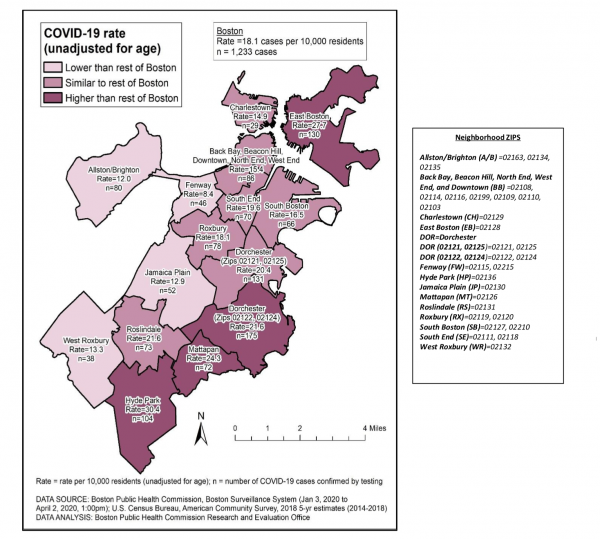April 4, 2020

A report published by the City of Boston's Public Health Commission on Friday offers the first glimpse into the distribution of COVID-19 cases by neighborhood— and so far, Dorchester and Mattapan are above the citywide average of 18 cases per 10,000 Bostonians.
Two Dorchester zip codes— 02124 and 02122 — recorded 175 positive cases through April 2 out of a citywide total of 1,233. That represents a rate of 21.6 cases per 10,000 residents. Dorchester zip codes 02121 and 02125 have a slightly lower rate, but are still higher than the citywide average, at 20.4/10,000.
The total number of COVID-19 positive cases in all of Dorchester as of Thursday at 1 p.m. was 306, according to the BPHC. That's about 24 percent of Boston's share of cases to date. Dorchester has 126,146 residents— or about 18 percent of the city's total population, according to the Boston Planning and Development Agency's most recent analysis of census figures.
Mattapan had 72 reported cases, according to the city agency— a rate of 24.3 per 10,000. Mattapan is home to 26,170 residents by the city's latest estimate.
Hyde Park led the city in terms of case rate at 30.4 per 10,000 residents.
As of 1 p.m. on April 2, a "total of 1232 cases of laboratory-confirmed COVID-19 among Boston residents have been reported to the Boston Public Health Commission (BPHC)," the agency reported in its analysis. "Of these, 96 required hospitalizations. Ten residents have died. One hundred and six (8.6%) have recovered."
City Councillor Andrea Campbell, whose district includes parts of Dorchester and Mattapan in District 4, said she was "not surprised that neighborhoods are impacted at a higher rate than other neighborhoods in the city."
"Populations in these neighborhoods are dealing with economic inequality and health disparities, and they will suffer even more during a health crisis like this pandemic," Campbell told the Reporter. “What keeps me up at night frankly is thinking about the impact that the aftermath that we’re going to have.”
“It’s critically important that when we do the work of addressing inequalities that we do it through an equity lens, that need to be at the center of the work otherwise those inequalities will continue to be exacerbated," Campbell said.
As Adam Gaffin at Universal Hub notes: "The report does not attempt to explain the neighborhood numbers; for example, whether they are actually due to higher numbers of infected people or whether they are due to the neighborhoods having more people who, especially in the early days of the outbreak, were more likely to be recommended for one of the then scarce test kits. Or maybe, non-medical front-line workers (police officers, firefighters, T workers, custodians, etc.) are more likely to live there."
-Developing-




